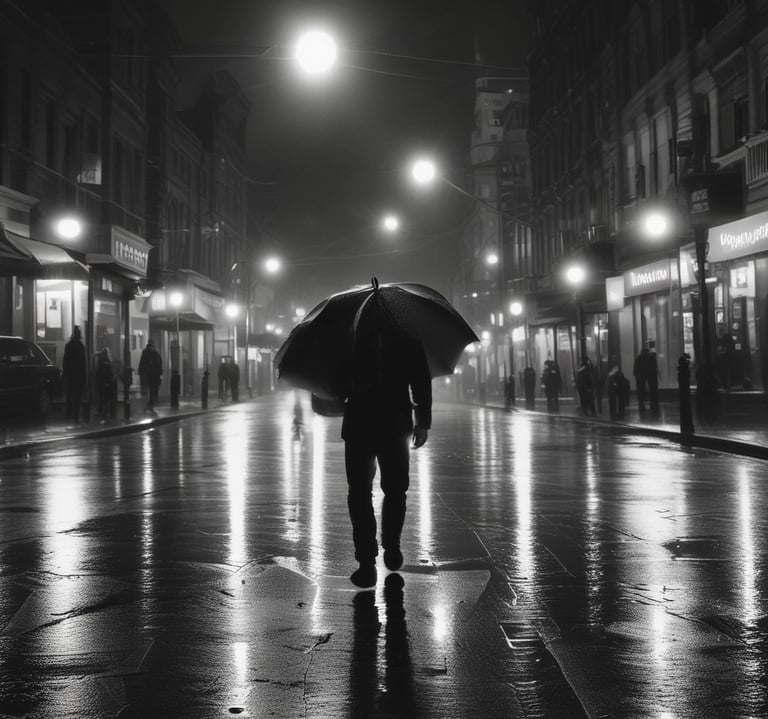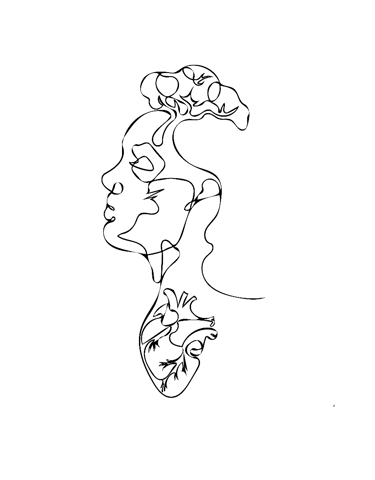Falling: A Love Story That Nearly Broke Me
Ping. You have a new match. My heart races as I see the little yellow Bumble icon flash on my screen. Maybe this time, it will be something special.
And damn, it was. Little did I know that this tiny notification would send me spiraling into a love so intense that I would find myself on the edge of a bridge just a few months later, questioning everything I believed about love, myself, and life itself.
Love
Jana and I quickly started dating, and despite some struggles, I fell for her immediately. The biggest challenge was seeing each other as often as I wanted—my long work hours and her chronic illness often got in the way. She also struggled to commit to plans in advance, which initially made me wonder if she truly liked me. At times, I felt she didn’t value my time, but it never bothered me too much. The connection between us was undeniable—I felt butterflies and had the urge to listen to love songs daily, especially after our dates.
As time passed, we grew closer. Though the hurdles remained, we saw each other more and spent hours on the phone. Every evening after work, we’d talk for hours, laughing, sharing personal stories, and joking about the future. Whenever she texted at bedtime to ask if I was awake, I couldn’t help but smile. She often initiated calls and, if she canceled a date, we’d still spend the evening “together” over the phone.
"Things moved fast, and I wouldn’t have wanted it any other way. The chemistry was unlike anything I’d ever felt—I was convinced she was the one."
One night, we even talked for eight hours straight, losing sleep but loving every second. Emotionally, things moved fast, and I wouldn’t have wanted it any other way. The chemistry was unlike anything I’d ever felt—I was convinced she was the one. At that point, nothing could have changed my mind. Eventually, we became a couple, and to me, everything felt perfect.
A Fragile Foundation & Growing Obsession
Before Jana, my love life had been disappointing, and I was eager to find a lasting relationship. At 26, I had little success with women I truly liked—either ending up in the friend zone or too afraid of rejection to make a move. My past relationships lacked deep feelings, and looking back, I was likely in them just to “tick a box.” I struggled with self-doubt, convinced I wasn’t attractive or charming enough, which made it hard to believe someone as great as Jana would want me. Desperate for love, I obsessed over dating—tweaking my Tinder profile, watching flirting tips, and trying to appear more confident. With internal and external pressure mounting, I failed to see the flaws in my thinking and the risks of investing so much of my happiness in one person. So, when Jana came into my life, she wasn’t just another relationship—she was my chance.
The fear of losing her consumed me. I became obsessed. Every interaction, every message, every canceled date sent me into overdrive, dissecting every word, every moment. I rearranged my entire life around her, convinced that if I just tried hard enough, if I just proved myself, she would stay.
As the weeks went by, I became more and more attached to Jana. She was no longer just a person I was dating—she became my world. Every part of my day revolved around her. I checked my phone constantly, watching for her to come online, feeling an instant surge of joy when she messaged and an aching emptiness when she didn’t.
At work, I struggled to focus, my mind always preoccupied with thoughts of our next date, planning little surprises to make her smile. I started tailoring my personality to match hers, shifting my opinions to align with what I thought she wanted. “I was constantly afraid that I might do or say something that could ruin the relationship.”
“What is a weekend with my friends compared to a lifetime with her?”
I pinned our chat to the top, so I could instantly see if she was typing. I barely made plans with friends, always keeping my schedule open for her, just in case she wanted to meet. I even canceled a trip to Munich with my closest university friends because I hadn’t seen her in two weeks and the thought of waiting another week felt unbearable. “What is a weekend with my friends compared to a lifetime with her?”
I told myself this was love. But looking back, it was desperation—an overwhelming fear of losing her, of being alone, of proving to myself that I was worthy of love.
The Breaking Point
The evening started perfectly—tapas, laughter, and the warm glow of a dimly lit Spanish bar. I had been counting down the days, eager to see her again. After dinner, we took a moonlit walk by the river, everything feeling effortlessly right. I had even prepared breakfast for the next morning, excited to surprise her. But midway through the date, something shifted. She seemed unwell, said her heart was troubling her, and needed to go home for her medicine—but promised to meet me later. As I watched her leave, a deep unease settled in. Something felt off, and no matter how much I told myself it was fine, I couldn’t shake the feeling that she wasn’t coming back.
Back home, I tried to wait, but anxiety devoured me. I lasted maybe 90 seconds before pacing my apartment, then rushing outside, wandering the streets aimlessly while checking my phone and tracking train schedules, desperate for some reassurance. Panic crept into my body, settling in my legs, making it impossible to stay still. My mind spun out of control: If she doesn’t come back, is this the beginning of the end? My thoughts raced with no resolution, and the sheer weight of uncertainty made me physically ill—I cried, I puked, I tried to breathe, but nothing helped. After what felt like an eternity, my phone finally rang. She wasn’t coming. I told her it was fine, but deep inside, I felt something shatter. The relief of knowing was fleeting, quickly replaced by a suffocating fear that everything was slipping away.
I spent the entire night obsessing over how to fix things, unable to sit with the discomfort. Eventually, in a desperate attempt to prove my love, I left the breakfast at her doorstep despite knowing she didn’t like surprises. My message to her began with: “Hey, please don’t hate me now, but…” Even I should have realized that wasn’t a good sign. Her reply confirmed my worst fears: “Jhonny, this is too much.” From that moment, everything shifted. She pulled away, our conversations dwindled, and I spiraled. The silence was unbearable—I overanalyzed every delay in response, every day without a message. Panic attacks became routine. I would spend hours pacing, punching walls, screaming into pillows, even making myself sick. My hands bled some days, but I had no outlet for the all-consuming anxiety. Yet, despite the pain, I was too afraid to demand answers, convinced that giving her space was my only chance to fix things.
Eventually, it became too much. Another canceled date pushed me over the edge, and I finally asked to talk. That night, she ended it. She cared about me, but things had moved too fast—she couldn’t give me what I needed, and I liked her more than she liked me. As painful as it was, part of me had seen it coming. But that didn’t make it hurt any less.
“Jhonny this is too much”
Drowning in Regret and Helplessness
Alcohol. Now! Those were the only words I could send to my friend as I stood outside Jana’s apartment, my heart in shambles. The breakup was only a week old, and the sight of her had torn through my already fragile state. I wanted to forget—her, us, everything. Drinking felt like the only escape from the relentless loop of memories and pain in my head. My mind screamed for numbness, for the unbearable weight of regret to lift, even if just for a moment. I needed to disappear from my own thoughts.
The days that followed were no better. My mind latched onto every tiny interaction we ever had, dissecting and replaying them in an endless cycle of self-blame. What if I had acted differently? Could I have saved us? The questions had no answers, yet they tortured me relentlessly. Self-punishment became my routine—fluctuating between bitter anger at myself and agonizing sorrow over what would never be. My emotional state crumbled under the weight of what-ifs, dragging me deeper into a pit of hopelessness.
The nights were the worst. The moment I was alone, my emotions erupted like a storm I couldn’t contain. My chest burned, my fists lashed out at pillows, walls—anything to externalize the unbearable internal pain. I screamed into the silence, begged for the thoughts to stop, pleaded for relief. But there was none. Sleep was my only escape, yet even then, my dreams refused to let me go. They taunted me with visions of her, of what we once had, of what was now irreversibly lost. Each morning, I woke up feeling more exhausted than before, crushed under the suffocating weight of hopelessness.
I abandoned my routines. The gym, work, even basic self-care felt pointless. What was the purpose of looking good, of staying fit, of showing up to life when none of it mattered anymore? The world outside my bedroom felt foreign, empty. I longed for sleep—not just to rest, but to disappear. At least in my dreams, she was still with me.
"Sleep was my only escape, yet even then, my dreams refused to let me go. They taunted me with visions of her, of what we once had, of what was now irreversibly lost. Each morning, I woke up feeling more exhausted than before, crushed under the suffocating weight of hopelessness."
The Seductive Whisper of an Exit
As the days blurred into each other, a new thought crept into my mind—one that I never anticipated, yet it felt eerily natural. Why am I even here? The idea sent a shiver through me at first, but the more it lingered, the more it started making sense. My world had become a void of regret and sorrow, an endless tunnel with no light at the end. The thought of leaving it behind was both terrifying and oddly comforting. At least, it would mean an end to this suffering.
At work, I stared blankly at my screen, unable to focus. My apartment reflected my mental state—messy, neglected, lifeless. Panic attacks became routine, triggered by the smallest things: a song on the radio, the sight of a couple holding hands, the mere thought of her. Each attack left me gasping, shaking, drowning in waves of unbearable grief. The pain wasn’t just emotional anymore; it had taken over my body, leaving me in a constant state of exhaustion. And then, amid the chaos of my thoughts, the idea resurfaced. I could just end it.
"The thought of suicide transformed from something horrifying into something… peaceful. It became my safe haven, my mental escape."
At first, I fought the thought. I reminded myself of my friends, my family—of the devastation my absence would bring. But even those reasons began to lose their grip on me. I wasn’t staying for myself anymore. I was staying for them. And was that really a good enough reason? The thought of suicide transformed from something horrifying into something… peaceful. It became my safe haven, my mental escape. Whenever a panic attack hit, I told myself that I had a way out. The knowledge alone gave me a sense of control that I had lost in every other aspect of my life.
The scariest part was how normal these thoughts became. They no longer carried the weight of fear—only quiet resignation. It felt like I had already said goodbye to the world in my mind, making the idea of actually leaving it less shocking. I was teetering on the edge of a decision I wasn’t sure I could come back from. And the longer I stayed in this state, the more it felt like I had already gone too far to turn back.
Choosing to Stay
The realization of how close I was to ending it all hit me like a shockwave, leaving me in a strange silence where I felt completely alone. I had been aware of my pain and suicidal thoughts before, but this moment was different—it was raw, undeniable, and oddly honest. As I gazed into the night sky, I asked myself if I truly wanted to disappear, but no clear answer came; it was both a ‘yes’ and a ‘no’ at the same time. Despite the hopelessness and suffering, something deep inside me refused to let go, a small, stubborn force telling me to “march on.”
In that instant, I didn’t know how I was going to move forward, only that I had to. My mind overflowed with questions—how to overcome the pain, how to forget her, why I feared being alone, and whether I could change—but none had clear answers. The journey ahead felt impossible, a battle against decades of self-doubt and pain that wouldn’t be won overnight. Still, if I wanted to give life another chance, I had no choice but to take the first step, no matter how uncertain or difficult it seemed.








